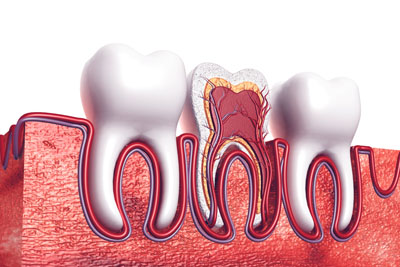Why Is Dental Pulp Important?

When it comes to tooth anatomy, every part of the tooth is vital and serves a purpose. The enamel serves as the first line of defense, the armor for the tooth. The dentin serves as the skeleton, creating a structure and framework. The root sinks into the jawbone for maximum stability, and the gumline forms a seal to protect it all.
But what is dental pulp and why does the tooth need it?
Growth of the tooth
The dental pulp, also called the endodontium, contains all the living tissue in the tooth and acts as a kind of brain or heart for the rest of the tooth. It provides the blood and other materials needed to create and grow the teeth, which is why the dental pulp is so important in young people.
Once the adult tooth erupts, the dental pulp simply provides blood to the area.
Blood vessels
The dental pulp is full of tiny, tightly packed blood vessels that come from the jaw, through the pulp and extend into the dentin. This is, unfortunately, how tooth decay and bacteria get into the pulp once the enamel has worn away.
Nerves
The dental pulp is the nerve center of the tooth, which is also where most of the pain comes from. The nerve networks of the dental pulp are extensive, which is probably why toothaches are so painful and debilitating.
Structural integrity
Dental pulp is low on the list of structures that keep the tooth rigid and strong, but it Is not without merit. For instance, once the dental pulp is removed (like after a root canal), the tooth can sometimes become brittle and more likely to crack.
This is why dental crowns are often recommended after root canals, in order to make up for the loss of the dental pulp and any small cracks or fissures formed by the surgery itself.
Problems with dental pulp
Unfortunately, all these unique characteristics also make dental pulp one of the most common problem areas for dental work. Most toothaches and tooth pain come from the dental pulp, simply because it is the living part of the tooth that is jam-packed with tissue and nerves.
Sometimes, dental pulp has to be removed entirely (such as in a root canal) when the area is infected and becomes too painful. Now, for a full-grown tooth, this is not a huge loss, but the procedure itself (while better than it once was) is still something most of us would like to avoid.
Questions about dental pulp?
Wondering if your dental pulp is the source of your tooth pain? Want to know more about how it grows the tooth, what its functions are or how to best take care of your teeth and pulp? Visit or call your dentist to learn more.
Call (718) 841-9591 today to reach Metro Smiles Dental.
Related Posts
Whether you are missing a tooth or have a cracked tooth that needs repair, restorative dentistry can help. This article will discuss some of the most common dental restoration services available today.A tooth-colored filling, also known as composite resin, is made of plastic and can be used to replace decayed areas of teeth. The material…
Cracked and chipped teeth can be unsightly and painful, but dental restoration can help. Even a painless chip or crack may become a bigger problem if left untreated. Severe pain, swollen and tender gums, and infection may result. In the worst cases, it will be necessary to extract the broken tooth. There are many ways…
You may need a type of dental restoration at some point in your life. There are many types of treatments available. Knowing how to select each one can give you the results that you need. Here are some tips on how to choose the right type of dental restoration procedure that will fit your dental…
Dental restorations procedures repair damaged or decayed teeth and improve their appearance. Multiple restoration procedures are available today, each with unique benefits and drawbacks. The following article presents the various options for dental restoration procedures and which may be the most effective treatment option for you and your smile.Dental fillings are the most common type…
